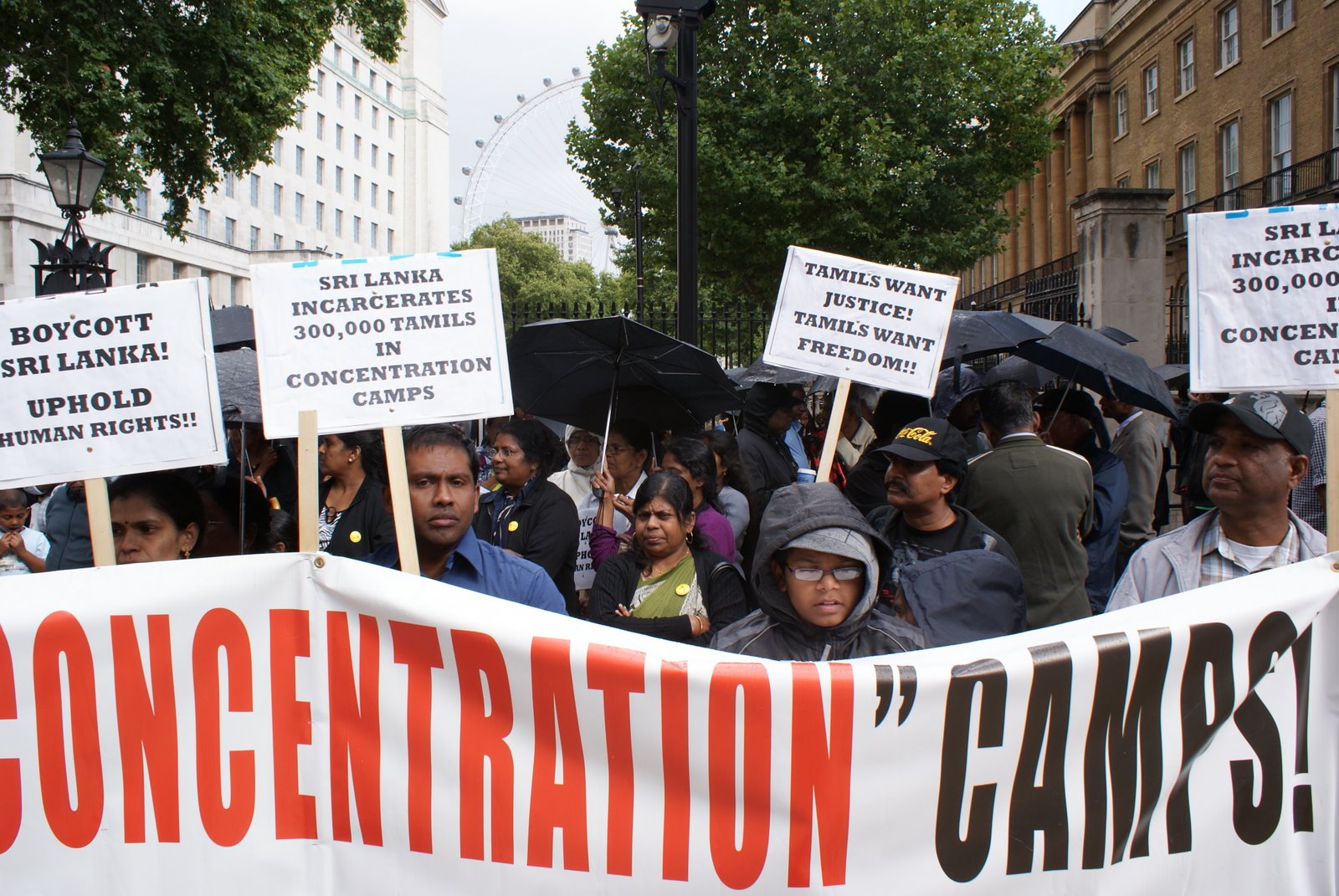Truth and Justice within and beyond Sri Lanka: the continued repression of the Tamil diaspora

Truth and Justice within and beyond Sri Lanka: the continued repression of the Tamil diaspora
Dr Victoria Sentas*
The end of almost three decades of civil war in Sri Lanka has not yet seen an end to alleged human rights violations against the Tamil population. Nor has it seen the end to uses of laws in foreign states, including the UK and Australia, to limit the political expression of Tamil diaspora.
The Government of Sri Lankas (GoSL) military annihilation of the Liberation Tigers of Tamil Eelam (LTTE) saw the death of tens of thousands of civilians in the final months of the war. Allegations of widespread crimes against humanity include summary executions and the deliberate military shelling of declared no-fire zones and hospitals. Of the 300 000 internally displaced peoples interned in camps after the war, approximately 25,000 people still await resettlement. Over 11,000 suspected LTTE combatants were detained without charge at the end of the war: an estimated 8 000 remain in the legal black hole of camps.
On Tuesday 19 October 2010, the International Institute for Strategic Studies (IISS) hosted an IISS-Sri Lanka Foreign Ministry Dialogue to coincide with the visit to the UK of Professor GL Peiris, the Sri Lankan Minister of External Affairs. In his Keynote Address, Peiris criticised continued calls by the international community for an independent international inquiry into war crimes committed by the GoSL and the LTTE, to amount to a colonial intervention.
Sri Lanka instead set up an internal inquiry in March this year, the Lessons Learnt and Reconciliation Commission. Advocating a home grown mechanism sensitive to the nuances of Sri Lanka Peiris warned that negativity about Sri Lankas ability to deal with its own problems assumed a judgment of its failure. The Commissions members include those who served as senior government officials during the final years of the war, prompting fears an impartial and independent account of the truth may be unlikely.
The complex task of truth telling to enable justice and reconciliation is threatened not only by the partiality of the Commission. Amnesty International, Human Rights Watch and the International Crisis Group refused to give evidence before the Commission. The three organisations cited that the Commission has no mandate requiring it to investigate allegations of both Government and LTTE crimes. The lack of witness protection and the failure of past government commissions of inquiry they argue, undermine the present Commissions capacity to investigate alleged crimes.
Minister Peiris painted a picture of post conflict Sri Lanka with a population united in sharing the dividends of increasing national economic growth buoyed by international investment: The people are carefree, laughing and living their lives without coercion. The Northern region of Sri Lanka however remains a militarised zone. Emergency powers which criminalise political speech are enforced against the free media and ordinary people. Capacity building in the North has been restricted by limits on the interventions of NGOs. The European Centre for Constitutional and Human Rights in September 2010 writes this of conditions in the North: Homes are being destroyed, people from other regions are resettling the evacuated villages, cultural heritage, as well as, religious symbols are intentionally being destroyed, while the Tamil language is disappearing.
The UK Telegraph reported on 21 October 2010 that photos provided to it from the Global Tamil Forum, show an alleged massacre by Sri Lankan armed officers, picturing dead men and women blindfolded and bound. For Peiris, these, as yet unverified, photos demonstrate a political strategy by the Tamil diaspora to discredit his Governments efforts for reconciliation. For Tamil organisations, these photos strengthen the case for an independent commission to investigate their authenticity in order for the truth to be aired.
During the conflict, the Tamil diaspora were routinely misrepresented as a homogenous pro-LTTE block which prolonged the war. Today, the Tamil diaspora are charged by the Sri Lankan Government with hindering Sri Lankas post war reconstruction. The IISS dialogue session entitled Countering Terrorism & Transnational Terrorist Front Organizations highlighted the hegemony of this approach to criminalising the diaspora. Controversial counter-terrorism expert, Prof Rohan Gunaratna, named the Global Tamil Forum and the Transnational Government of Tamil Eelam as fronts for the LTTE. IISS speakers however argued that the LTTE no longer exists militarily. While none of these diaspora organisations maintain public positions for the restarting of armed conflict, the Tamil diaspora remain the object of criminalisation by states across the Euro-Atlantic world.
Across the globe Tamil diaspora maintain strident critique of the GoSL, calling for the Governments prosecution for war crimes and genocide. The GoSL reports that Gunaratna gave evidence to the Lessons Learnt and Reconciliation Commission in October. He stated there that “LTTE members and sympathizers in charge of propaganda disseminate various misinformation and they carry fabricated stories against the government and the security forces.” The continued banning of the LTTE as a terrorist organisation, despite the fact the LTTE no longer exist, serves to criminalise diverse non-violent political expressions for self-determination. It also silences critics of the GoSL as terrorists and imputes Tamil nationalism as being political violence.
Gunaratna maintained that terrorist organisation prosecutions against Tamil defendants in the UK and Australia successfully targeted terrorist financing. Gunaratna did not mention one critical fact about the cases in these countries. The defendants were found guilty in both cases for providing finances to the LTTE for the intended purpose of humanitarian aid during the ceasefire agreement a peaceful purpose nevertheless criminalised by the terrorist organisation laws in the UK and Australia.
In finding the defendant guilty of providing funds, the UKs Criminal Court in R v Arunchulum Chrishanthakumar concluded that he did no more than the British government did, albeit illegally, in sending aid to the LTTE during the period of the ceasefire agreement. In R v Vinayagmoorthy, the Supreme Court of Victoria, Australia found that the defendants motives in sending funds and equipment were not purposely to assist terrorist activity, but rather intended to assist the Tamil people and the only available vehicle to do this was through the LTTE.
The judiciary in both cases highlighted that the LTTE were then the effective government of the north-east of Sri Lanka at the time funds were made. For the courts, the complex, multi-level character of the LTTE as military organisation, government and provider of essential services required the charges of terrorist financing to be put into this mitigating context.
The silencing of dissenting political voices through the label and laws of terrorism in countries like Australia and the UK is presented by Sri Lankan Government representatives as a necessary response to diasporas perceived political illegitimacy of a diaspora out of step with what Tamils in Sri Lanka really want. The Sri Lankan Governments insistence that political settlement is irrelevant to Tamils in Sri Lanka, dangerously misrepresents as a global terrorist threat the legitimate expression by Tamils to aspire for a homeland capable of administering freedom from discrimination and lasting peace.
* Dr Sentas is a friend of the International State Crime Initiative and a Newton research fellow at the School of Law, King’s College London










































